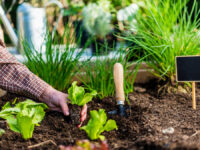
Study: Vegetable gardening can improve health outcomes for cancer survivors – News
A new study from UAB finds that a home vegetable garden can increase fruit and vegetable consumption as well as physical activity in cancer survivors.
 A new study from UAB finds that a home vegetable garden can increase fruit and vegetable consumption as well as physical activity in cancer survivors. Gardening is a great way to get outdoors and soak in vitamin D while also providing fresh vegetables to enjoy. Dietary guidelines recommend adults eat 2-3 cups of vegetables daily to prevent obesity and cardiovascular diseases and help with immune function. Because of this, eating ample amounts of vegetables is even more important for those who have had cancer.
A new study from UAB finds that a home vegetable garden can increase fruit and vegetable consumption as well as physical activity in cancer survivors. Gardening is a great way to get outdoors and soak in vitamin D while also providing fresh vegetables to enjoy. Dietary guidelines recommend adults eat 2-3 cups of vegetables daily to prevent obesity and cardiovascular diseases and help with immune function. Because of this, eating ample amounts of vegetables is even more important for those who have had cancer.
In a study published today in JAMA Network Open, University of Alabama at Birmingham researchers — in collaboration with researchers from Auburn University — found that vegetable gardening improved health outcomes among cancer survivors. Harvest for Health was a clinical trial conducted in 381 cancer survivors in Alabama who ranged from ages 50-95, and who were at greater risk of chronic disease because they consumed less than five servings of vegetables and fruit daily and completed less than 150 minutes of physical activity weekly.
The original study began in Jefferson County in August 2013 and expanded in January 2017 to include participants from an additional 26 counties across Alabama. In the study, participants were randomly assigned to two groups, one that would start the trial immediately and another that was assigned to a waitlist to begin the trial the following year. Each participant received either one raised bed or four grow boxes with seeds, gardening tools and recipes to start a home-based vegetable garden. Certified master gardeners from the Alabama Cooperative Extension System acted as mentors and provided biweekly guidance on planning, planting and caring for a garden. UAB study staff measured survivors’ strength, balance and agility, while collecting biospecimens and data on vegetable and fruit consumption and physical activity.
 Wendy Demark-Wahnefried, Ph.D.,
Wendy Demark-Wahnefried, Ph.D.,
Photography: Lexi Coon“Findings from the study showed that the survivors increased their intake of vegetables by roughly one-third of a serving per day,” said principal investigator, Wendy Demark-Wahnefried, Ph.D., professor and Webb Endowed Chair of Nutrition Sciences in the School of Health Professions. “They also had significant increases in mobility and function, perceived health and improvements in their gut microflora, when compared to the delayed intervention group.”
Cancer survivors are a vulnerable population at much greater risk for developing a second cancer, heart diseases and diabetes. Demark-Wahnefried, who is also a senior scientist at the O’Neal Comprehensive Cancer Center at UAB, says cancer survivors age at a faster rate and are more apt to become debilitated and lose their independence.
“Interventions that can support them in making healthier food choices, such as eating more vegetables, and providing more opportunities to increase physical activity are crucial,” she said. “I am hopeful that other studies in different environments and different populations of cancer survivors assess the benefits of gardening interventions. In the meantime, cancer survivors should explore ways to cultivate their health — and a vegetable garden is a good place to start.”
Read how one breast cancer survivor said Harvest for Health improved her outlook on life here.



